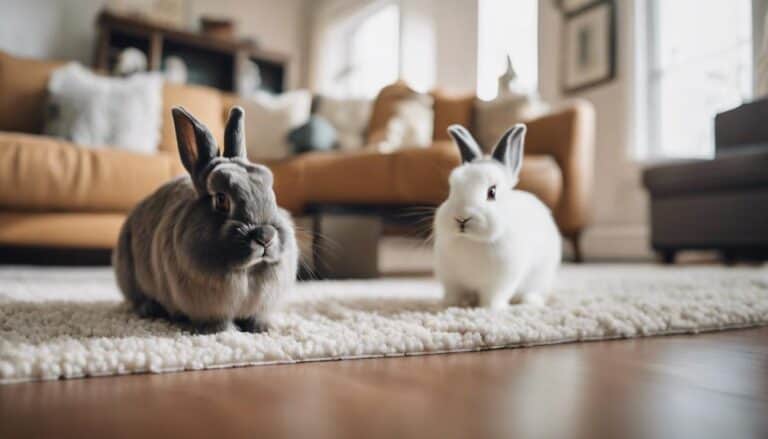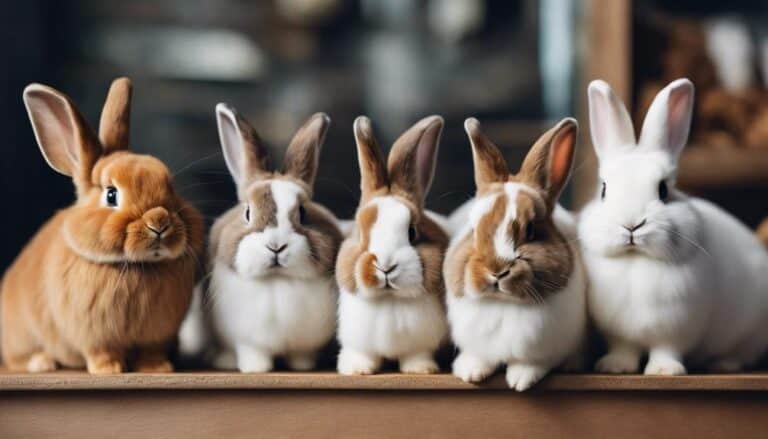Looking after an American Fuzzy Lop rabbit? Watch out for gastrointestinal stasis symptoms like decreased appetite. Dental issues show with drooling or weight loss. Prevent obesity by monitoring diet and encouraging exercise. Guarantee respiratory health with clean living spaces. Watch for urinary tract symptoms like blood in urine. Skin irritations could be due to mites. Manage hot spots by maintaining good hygiene. Assist them in regulating temperatures for comfort. Keep an eye out for genetic disorders and eye health problems. Early detection is crucial. Stay informed to keep your fluffy friend healthy and happy.
Contents
- 1 Key Takeaways
- 2 Gastrointestinal Stasis
- 3 Dental Problems
- 4 Obesity Risks
- 5 Respiratory Diseases
- 6 Urinary Tract Issues
- 7 Parasitic Infections
- 8 Skin Conditions
- 9 Temperature Sensitivity
- 10 Genetic Disorders
- 11 Eye Health
- 12 How Can Grooming Help Prevent Health Issues in American Fuzzy Lop Rabbits?
- 13 Conclusion
Key Takeaways
- Gastrointestinal stasis: watch for decreased appetite, treat promptly with fluid therapy and pain meds.
- Dental problems: check for drooling, ensure regular dental care and access to chew toys.
- Obesity prevention: monitor diet, limit high-calorie foods, encourage exercise and playtime.
- Respiratory health: avoid poor ventilation, treat symptoms with antibiotics, improve living conditions.
- Urinary tract issues: look for straining to urinate, address with medication, dietary adjustments, and vet care.
Gastrointestinal Stasis

Experiencing gastrointestinal stasis in your American Fuzzy Lop rabbit can be a concerning and common issue that arises from a slowdown or stoppage in their digestive system. It's important to recognize the symptoms of gastrointestinal stasis, including decreased appetite, reduced fecal output, and lethargy in your beloved pet. When you notice these signs, prompt treatment is vital to prevent further complications.
To address gastrointestinal stasis in your American Fuzzy Lop rabbit, the treatment may involve fluid therapy to combat dehydration, syringe feeding to make sure they receive proper nutrition, pain medication to alleviate discomfort, and encouraging movement to stimulate their digestive system. Your attentive care and quick action can make a significant difference in your rabbit's recovery.
Dental Problems
If your American Fuzzy Lop rabbit starts showing signs like drooling, difficulty eating, or weight loss, it may indicate underlying dental problems such as overgrown teeth, abscesses, or malocclusions. These dental issues can arise from genetic factors, poor diet, lack of chewing opportunities, or trauma. It's important to provide your rabbit with appropriate chew toys to help prevent dental problems. Regular dental check-ups are also essential to catch any issues early on.
Signs of dental problems in American Fuzzy Lop rabbits may include drooling, difficulty eating, weight loss, and changes in behavior. If you suspect your rabbit is experiencing dental issues, seek prompt veterinary care to prevent complications. Dental problems can impair your rabbit's ability to eat and lead to serious health issues if left untreated. By addressing dental concerns promptly and providing proper dental care, you can make sure your American Fuzzy Lop rabbit maintains good oral health and overall well-being.
Obesity Risks
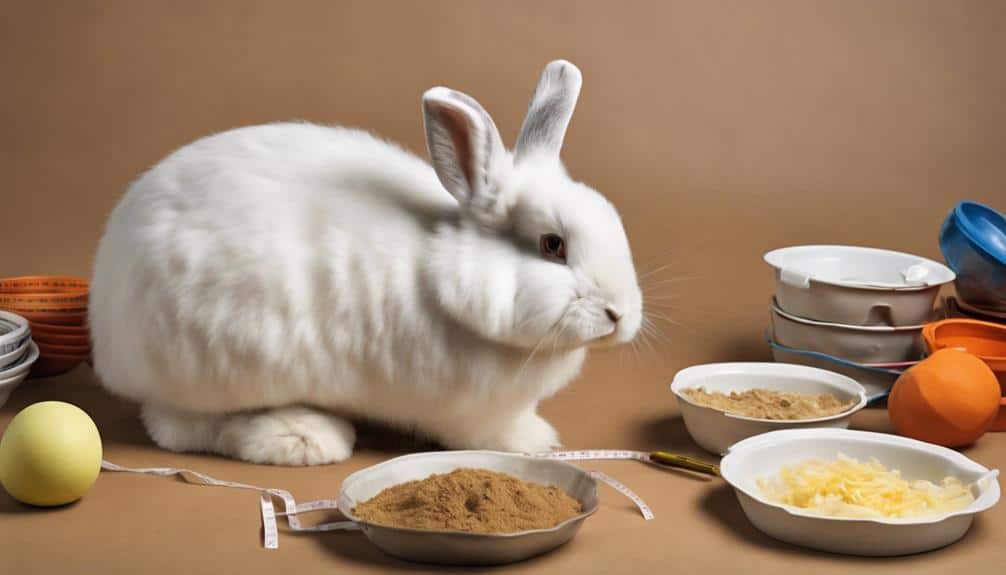
American Fuzzy Lop rabbits are at risk of developing obesity if their diet includes excessive treats or overfeeding. To prevent obesity in your furry friend, consider the following:
- Monitor Their Diet: Keep track of the amount and type of food your rabbit consumes to guarantee they aren't overeating.
- Provide Ample Hay and Grass: These high-fiber foods are essential for proper digestion and can help prevent obesity.
- Limit High-Calorie Foods: Avoid giving too many treats or foods that are high in sugar or fat to maintain a healthy weight.
- Regular Exercise: Engage your American Fuzzy Lop in supervised outdoor playtime or create an enriching indoor environment to encourage physical activity and prevent obesity.
Respiratory Diseases
What're the common causes of respiratory diseases in American Fuzzy Lop rabbits?
Respiratory diseases in American Fuzzy Lop rabbits can be triggered by various factors such as poor ventilation, dusty bedding, or exposure to cigarette smoke. These issues can lead to conditions like snuffles, pneumonia, and respiratory infections, which can escalate if not addressed promptly. Keep an eye out for symptoms like sneezing, nasal discharge, labored breathing, and lethargy, as these could indicate a respiratory problem in your American Fuzzy Lop rabbit. If you observe any of these signs, it's important to seek veterinary care promptly.
Treatment for respiratory diseases typically involves a combination of antibiotics, decongestants, and improving living conditions to minimize irritants. Prevention is key in safeguarding your rabbit's respiratory health, so make sure their living space is clean, well-ventilated, and free from any potential respiratory irritants like smoke. By maintaining a healthy environment and being vigilant about symptoms, you can help your American Fuzzy Lop rabbit stay healthy and happy.
Urinary Tract Issues
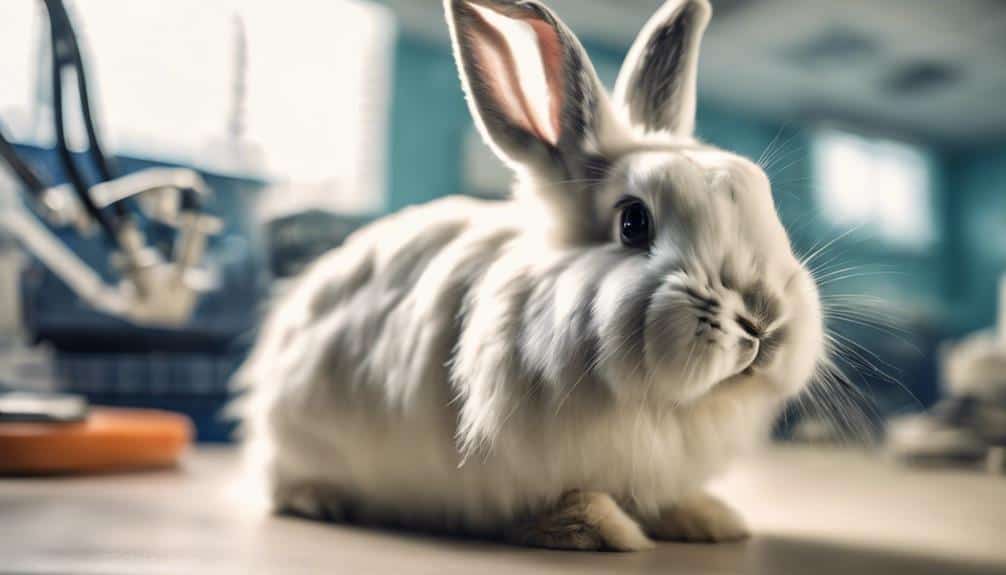
Urinary tract issues commonly affect American Fuzzy Lop rabbits due to their small size and genetic predisposition. These problems can cause discomfort and potentially serious health issues for your beloved pet. Here are some important points to keep in mind:
- Symptoms: Watch out for signs like straining to urinate, blood in the urine, and increased frequency of urination, as these could indicate urinary tract problems in your rabbit.
- Causes: The issues can stem from various factors such as bladder stones, infections, or an improper diet. Being aware of these causes can help you take preventive measures.
- Treatment: If your rabbit is diagnosed with a urinary tract problem, treatment may involve medication, dietary adjustments, or even surgery in severe cases. Prompt intervention is essential for your pet's well-being.
- Prevention: Providing fresh water, a balanced diet, and regular veterinary check-ups can go a long way in reducing the risk of urinary tract issues in American Fuzzy Lop rabbits. Your proactive care plays a crucial role in keeping your furry friend healthy and happy.
Parasitic Infections
Parasitic infections in American Fuzzy Lop rabbits, such as mites, fleas, and worms, can lead to various symptoms like itching, hair loss, weight loss, diarrhea, and a dull coat.
Regularly checking your rabbit for signs of parasites and maintaining a clean living environment are essential in preventing these infections.
Treatment typically involves medication prescribed by a veterinarian and strict adherence to proper hygiene practices.
Common Parasitic Infections
To effectively protect your American Fuzzy Lop rabbit from common parasitic infections like mites, fleas, and intestinal worms, proactive measures can be taken through regular grooming and maintaining a clean living environment. These steps are vital in preventing the discomfort and health issues that parasitic infections can cause in your beloved pet. Here are some key points to keep in mind:
- Regular Grooming: Brush your rabbit's fur frequently to check for any signs of mites or fleas.
- Clean Living Environment: Keep your rabbit's living quarters clean and dry to reduce the risk of parasitic infestations.
- Monitor Behavior: Watch for symptoms such as itching, hair loss, or changes in appetite that could indicate a parasitic infection.
- Consult a Veterinarian: Seek professional advice if you suspect your rabbit has a parasitic infection for proper diagnosis and treatment.
Prevention and Treatment
To effectively safeguard your American Fuzzy Lop rabbits against parasitic infections, it's essential to regularly deworm them with a suitable paste and maintain a clean living environment. In addition to deworming, incorporate preventive measures by ensuring their grooming process includes trimming their fur to minimize the risk of parasites finding a habitat in their coats.
Watch for signs of parasitic infections such as weight loss, poor coat condition, and diarrhea. Keeping their living space clean and dry further reduces the chances of infestations. If you suspect or confirm a parasitic infection, seek guidance from a veterinarian for appropriate treatment.
Prioritize proper hygiene and regular veterinary check-ups to uphold your rabbits' health and well-being.
Skin Conditions
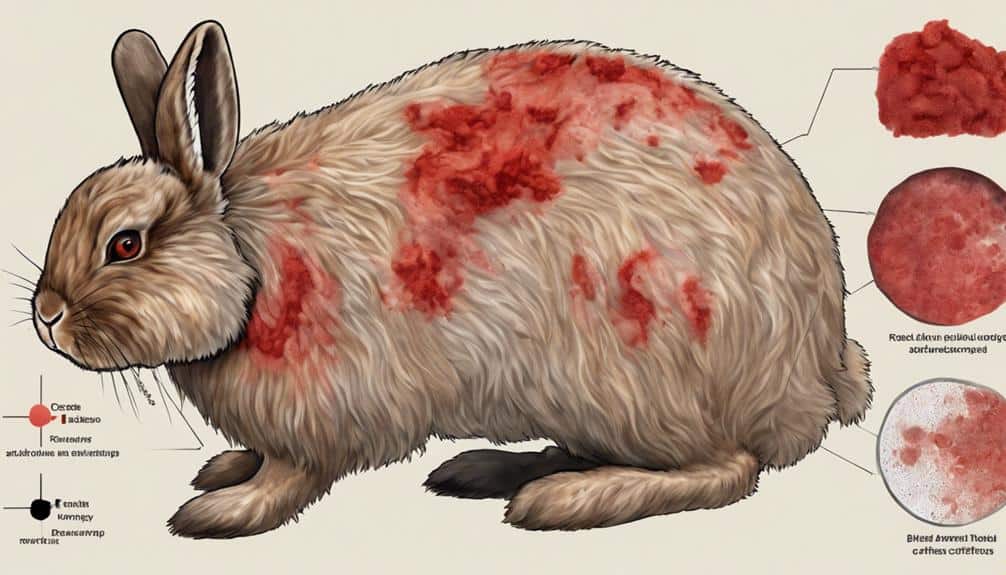
Check your American Fuzzy Lop rabbit's fur regularly for signs of fur mites or hot spots, which can lead to discomfort and skin issues.
Proper grooming and a clean living environment can help prevent skin conditions caused by stress or poor diet.
If you notice any redness, itching, or flakiness on your rabbit's skin, consult a vet for a proper diagnosis and treatment plan.
Fur Mites
Fur mites, tiny parasites that reside on the skin and fur of American Fuzzy Lop rabbits, can lead to skin irritation, itching, and hair loss. Here are some key points to help you understand fur mites better:
- Skin Irritation: Fur mites cause skin irritation, which can manifest as redness, scaly skin patches, and discomfort for your rabbit.
- Itching: One of the common signs of fur mites infestation is excessive scratching by the rabbit due to the discomfort caused by these parasites.
- Hair Loss: If left untreated, fur mites can lead to hair loss in affected areas, impacting the overall appearance of your beloved rabbit.
- Treatment: Treatment for fur mites typically involves using topical medications prescribed by a veterinarian to eliminate the mites and alleviate the associated skin issues.
Hot Spots
Hot spots, also known as acute moist dermatitis, are common skin conditions that can affect American Fuzzy Lop rabbits due to various factors such as excessive licking, scratching, or moisture on their skin. These skin lesions manifest as red, inflamed, and moist areas typically found on the back, neck, or hindquarters of the rabbit. Allergies, parasites, poor grooming habits, or underlying skin infections can contribute to the development of hot spots in American Fuzzy Lops.
Treatment for hot spots involves cleaning the affected area, applying veterinarian-prescribed topical medications, and addressing the root cause. To prevent hot spots, maintain good hygiene practices, make sure the skin stays dry, and implement proper grooming techniques along with parasite control measures for your American Fuzzy Lop rabbit's well-being.
Temperature Sensitivity
American Fuzzy Lop rabbits require careful monitoring and adjustment of their surroundings to maintain their well-being due to their sensitivity to extreme temperatures. Here are some essential points to keep in mind:
- Moderate Climates: These rabbits thrive in moderate climates and can struggle in both very hot and very cold conditions.
- Heat Stress: In hot weather, American Fuzzy Lops are prone to heat stress. Provide cooling methods such as frozen water bottles or ceramic tiles for them to lay on.
- Cold Weather Care: During cold weather, make sure they're in a draft-free area with ample bedding and shelter to keep warm.
- Temperature Adjustments: Regularly monitor and adjust their environment to maintain a comfortable temperature, as sudden changes can impact their health.
Genetic Disorders
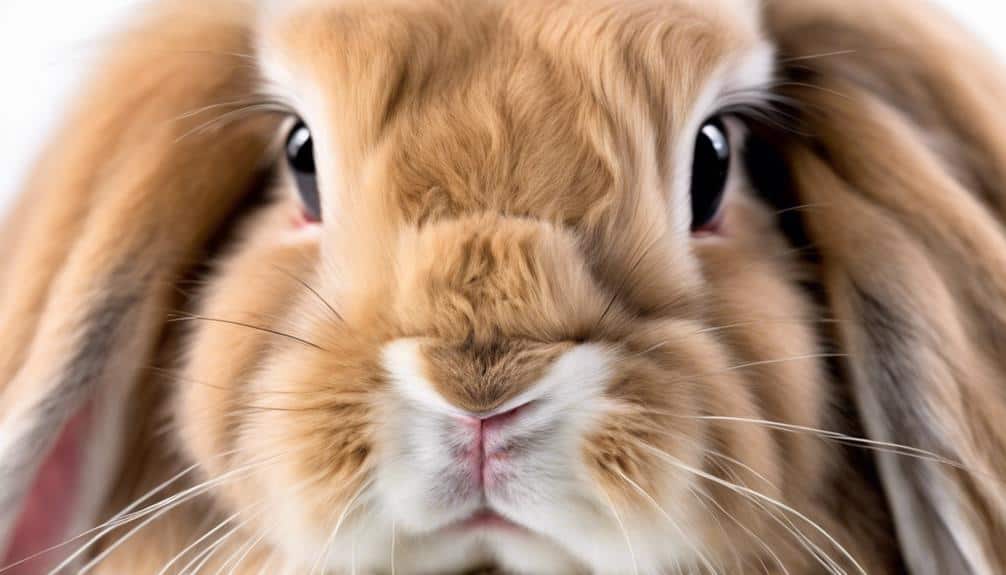
Given the intricate genetic makeup of American Fuzzy Lop rabbits, it's important to be aware of potential genetic disorders that may impact their health and well-being. Two common genetic disorders seen in American Fuzzy Lops are dental malocclusion and splay leg. Dental malocclusion can lead to eating difficulties and overall health issues, necessitating regular dental care. On the other hand, splay leg affects mobility and quality of life as the legs splay out to the sides.
Genetic disorders like wool block, which can cause digestive blockages, and congenital heart defects are also concerns for American Fuzzy Lop rabbits. Wool block, a result of their wooly fur, requires immediate veterinary attention. Congenital heart defects, though less common, can affect the rabbit's health and lifespan, needing close monitoring and potential medical intervention.
To ensure the well-being of these rabbits, responsible breeding practices and routine veterinary check-ups are important in identifying and managing genetic disorders promptly. By staying informed and proactive, you can help your American Fuzzy Lop lead a happy and healthy life.
Eye Health
Check your American Fuzzy Lop rabbit's eyes regularly for any signs of discharge, redness, or swelling, as they're prone to eye infections like conjunctivitis.
Keeping the area around their eyes clean and dry is essential in preventing bacterial or fungal growth that can lead to eye issues.
Common Eye Problems
If your fuzzy lop rabbit exhibits excessive tearing, redness, squinting, or cloudiness in their eyes, it could be indicative of common eye problems such as cataracts, conjunctivitis, or corneal ulcers. Here are some essential points to bear in mind regarding common eye problems in American Fuzzy Lop rabbits:
- Symptoms: Watch out for signs like excessive tearing, redness, squinting, or cloudiness in your rabbit's eyes.
- Early Detection: Regular veterinary check-ups can help detect and treat eye issues early in American Fuzzy Lop rabbits.
- Prevention: Maintain proper hygiene and a clean living environment to prevent eye infections and promote good eye health.
- Seek Professional Advice: If you notice any changes in your rabbit's eyes, consult a vet promptly for a proper diagnosis and treatment.
Preventative Care Tips
To maintain peak eye health for your American Fuzzy Lop rabbit, consistently monitoring their eyes for any signs of redness, discharge, or cloudiness is essential. Regularly checking your rabbit's eyes can help you detect any potential issues early on.
Keeping your rabbit's living area clean is also important in preventing eye infections and irritations. Make sure your pet receives a balanced diet consisting of hay, fresh vegetables, and an adequate water supply to support overall eye health.
Avoid exposing your rabbit to harsh chemicals or strong scents as these can cause eye irritation. If you notice any changes in your rabbit's eye health, don't hesitate to consult a veterinarian for proper diagnosis and treatment.
Your attentiveness and care play an important role in safeguarding your American Fuzzy Lop's eye health.
Veterinary Treatment Options
Wondering what veterinary treatment options are available to address eye health issues in American Fuzzy Lop rabbits? Here are some options that may be considered:
- Eye Drops: Your vet may prescribe specialized eye drops to help treat infections or reduce inflammation in your rabbit's eyes.
- Ointments: Ointments can be beneficial in cases where a more prolonged treatment is needed, such as for managing certain eye conditions.
- Oral Medications: In some instances, oral medications may be necessary to address underlying issues contributing to your rabbit's eye health problems.
- Surgical Intervention: In severe cases, surgery might be recommended by your vet to correct serious eye health issues that can't be resolved through other means.
How Can Grooming Help Prevent Health Issues in American Fuzzy Lop Rabbits?
The importance of grooming for American Fuzzy Lop rabbits cannot be overstated. Regular grooming helps prevent health issues such as fur mattedness, hairballs, and skin infections. It also allows for early detection of any abnormalities or parasites. Grooming is essential for maintaining the overall health and well-being of these adorable rabbits.
Conclusion
To wrap up, it's important to bear in mind that prevention is crucial when it comes to the health issues that American Fuzzy Lop rabbits may encounter.
As the saying goes, 'An ounce of prevention is worth a pound of cure.' By staying informed, providing proper care, and keeping a close eye on your rabbit's well-being, you can help guarantee a long and healthy life for your furry friend.
Remember, a little effort now can save you a lot of worry later on.


